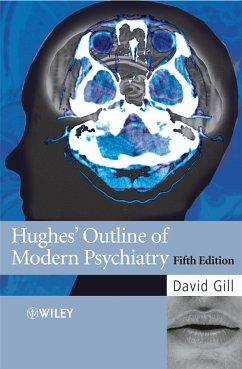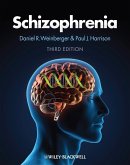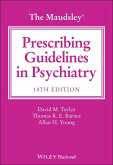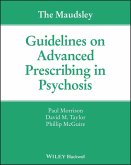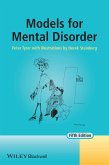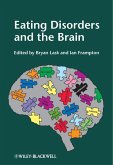Hughes' Outline of Modern Psychiatry (eBook, PDF)


Alle Infos zum eBook verschenken

Hughes' Outline of Modern Psychiatry (eBook, PDF)
- Format: PDF
- Merkliste
- Auf die Merkliste
- Bewerten Bewerten
- Teilen
- Produkt teilen
- Produkterinnerung
- Produkterinnerung

Hier können Sie sich einloggen

Bitte loggen Sie sich zunächst in Ihr Kundenkonto ein oder registrieren Sie sich bei bücher.de, um das eBook-Abo tolino select nutzen zu können.
Hughes' Outline of Psychiatry, Fifth Edition presents a comprehensive account of current practice in psychiatry, summarising up-to-date knowledge of the subject in a concise way. Part I touches on general classification, causes and prevention of mental disorders. It also outlines the basics of the psychiatric interview, examination and investigation. Part II gives an overview of the most common clinical syndromes, covering frequency, epidemiology, causes, clinical features, clinical types, diagnostic criteria, differential diagnosis and treatment for each disorder. Part III focuses on all…mehr
- Geräte: PC
- mit Kopierschutz
- eBook Hilfe
- Größe: 2.15MB
![Schizophrenia (eBook, PDF) Schizophrenia (eBook, PDF)]() Schizophrenia (eBook, PDF)173,99 €
Schizophrenia (eBook, PDF)173,99 €![The Dialectical Behavior Therapy Primer (eBook, PDF) The Dialectical Behavior Therapy Primer (eBook, PDF)]() Beth S. BrodskyThe Dialectical Behavior Therapy Primer (eBook, PDF)43,99 €
Beth S. BrodskyThe Dialectical Behavior Therapy Primer (eBook, PDF)43,99 €![The Maudsley Prescribing Guidelines in Psychiatry (eBook, PDF) The Maudsley Prescribing Guidelines in Psychiatry (eBook, PDF)]() David M. TaylorThe Maudsley Prescribing Guidelines in Psychiatry (eBook, PDF)54,99 €
David M. TaylorThe Maudsley Prescribing Guidelines in Psychiatry (eBook, PDF)54,99 €![The Maudsley Guidelines on Advanced Prescribing in Psychosis (eBook, PDF) The Maudsley Guidelines on Advanced Prescribing in Psychosis (eBook, PDF)]() Paul MorrisonThe Maudsley Guidelines on Advanced Prescribing in Psychosis (eBook, PDF)23,99 €
Paul MorrisonThe Maudsley Guidelines on Advanced Prescribing in Psychosis (eBook, PDF)23,99 €![Epilepsy in Children and Adolescents (eBook, PDF) Epilepsy in Children and Adolescents (eBook, PDF)]() Epilepsy in Children and Adolescents (eBook, PDF)123,99 €
Epilepsy in Children and Adolescents (eBook, PDF)123,99 €![Models for Mental Disorder (eBook, PDF) Models for Mental Disorder (eBook, PDF)]() Peter TyrerModels for Mental Disorder (eBook, PDF)40,99 €
Peter TyrerModels for Mental Disorder (eBook, PDF)40,99 €![Eating Disorders and the Brain (eBook, PDF) Eating Disorders and the Brain (eBook, PDF)]() Bryan LaskEating Disorders and the Brain (eBook, PDF)76,99 €
Bryan LaskEating Disorders and the Brain (eBook, PDF)76,99 €-
-
-
Dieser Download kann aus rechtlichen Gründen nur mit Rechnungsadresse in A, B, BG, CY, CZ, D, DK, EW, E, FIN, F, GR, HR, H, IRL, I, LT, L, LR, M, NL, PL, P, R, S, SLO, SK ausgeliefert werden.
- Produktdetails
- Verlag: Wiley-IEEE Press
- Seitenzahl: 432
- Erscheinungstermin: 30. April 2007
- Englisch
- ISBN-13: 9780470516577
- Artikelnr.: 37296169
- Verlag: Wiley-IEEE Press
- Seitenzahl: 432
- Erscheinungstermin: 30. April 2007
- Englisch
- ISBN-13: 9780470516577
- Artikelnr.: 37296169
- Herstellerkennzeichnung Die Herstellerinformationen sind derzeit nicht verfügbar.
PART I: THE NATURE AND ASSESSMENT OF PSYCHIATRIC DISORDER.
1 Classification.
The basis of classification.
Reliability and validity.
Limitations and problems of classification.
Common terms in psychiatric classification.
Classification systems.
2 Causes and Prevention.
Causation in clinical practice.
Historical background.
Genetics.
Neurochemistry.
Neuroradiology.
Epidemiology.
Individual life experience.
Prevention of psychiatric disorder.
3 Assessment.
Circumstances of referral.
The psychiatric interview.
Mental state examination.
Physical examination.
Structured interviews and questionnaires.
Further assessments.
Physical investigations.
PART II: CLINICAL SYNDROMES.
4 Schizophrenia.
Definition.
Frequency.
Epidemiology.
Causation.
Clinical features.
Clinical types.
Diagnostic criteria.
Differential diagnosis.
Treatment.
Prognosis.
5 Mood Disorders: Depressive Illness and Mania.
Frequency.
Epidemiology.
Causes.
Clinical features of depressive illness.
Types of depressive illness.
Diagnosis of depressive illness.
Clinical features of mania.
Differential diagnosis of mood disorders.
Treatment of depressive illness.
Treatment of mania.
Prophylaxis of affective disorder.
6 Anxiety and Stress-Related Disorders.
Boundaries of anxiety disorder.
Hierarchy of diagnosis.
Frequency.
Epidemiology.
Causes.
Clinical features.
Differential diagnosis.
Treatment.
Prognosis.
Generalized anxiety disorder (anxiety state).
Panic disorder.
Agoraphobia.
Social phobia.
Simple phobias (specific phobias, monophobias).
Obsessive-compulsive disorders.
Conversion and dissociative disorders.
Post-traumatic stress disorder (PTSD).
Adjustment disorders.
Bereavement.
7 Personality Disorders.
Definition.
Classification.
Types of personality disorder.
Epidemiology.
Differential diagnosis.
Treatment.
Prognosis.
Sociopathic (dissocial) personality disorder.
8 Paranoid States.
Definition.
Predisposing factors.
Differential diagnosis of paranoid states.
Management.
Culture-bound syndromes.
9 Physical Symptoms and Psychiatric Disorder.
Introduction.
Assessing physical symptoms in psychiatric practice.
Unexplainedphysical symptoms.
Management.
Malingering and exaggeration.
10 Organic Brain Syndromes.
Causes.
Clinical features.
Delirium.
Dementia.
Focal brain damage.
11 Liaison Psychiatry.
Psychological influences on the course of physical disease.
The stresses of physical illness.
Adjustment and coping.
Clinical depression in medically ill patients.
Management and prevention.
Liaison psychiatry.
12 Drug Misuse.
Definitions.
Epidemiology.
Causes.
Psychiatric and physical complications.
Legal aspects.
Pharmacology.
Prevention.
Treatment.
Opiates.
Amphetamines (speed).
Cocaine and crack.
Cannabis (Indian hemp, hashish, pot).
Lysergic acid diethylamide (LSD, acid).
MDMA (Ecstasy).
Glues and solvents.
Tobacco.
Caffeine.
Barbiturates.
Benzodiazepines.
13 Alcohol Misuse.
Safe limits of drinking.
Frequency.
Epidemiology.
Causes.
Effects of alcohol.
Course of alcohol abuse.
Recognition.
Treatment.
Prognosis.
Prevention.
14 Deliberate Self-Harm.
Suicide.
Non-fatal deliberate self-harm (parasuicide, attempted suicide).
15 Eating Disorders: Anorexia Nervosa and Bulimia Nervosa.
Introduction.
Anorexia nervosa.
Bulimia nervosa.
Obesity.
16 Disorders of Female Reproductive Life.
Pregnancy.
Puerperal psychosis.
Post-natal depression and other neurotic syndromes.
Abortion.
Stillbirth and perinatal death.
Premenstrual syndrome.
The menopause.
Hysterectomy.
17 Sexual Problems.
Sexual dysfunctions.
Sexual deviations.
Gender-identity disorders.
Homosexuality.
18 Child and Adolescent Psychiatry.
Predisposing factors.
Classification.
History taking and examination.
Treatment.
Relationship with adult disorder.
Neurotic (emotional) disorders.
Conduct disorders.
Attention deficit disorder.
Psychoses.
Delays in development.
Symptomatic disorders.
Child abuse.
Psychiatry of adolescence.
19 Learning disability.
Frequency.
Causes.
Diagnosis of learning disability.
Associated phenomena.
Management.
Prognosis.
Prevention.
Chromosomal abnormalities.
Gene abnormalities.
Acquired handicap.
Miscellaneous.
20 Psychiatry of Old Age.
Frequency.
Clinical syndromes.
Assessment.
Specific treatments.
Organization of services.
21 Forensic Psychiatry.
Offending behaviour.
Predicting violence and dangerousness.
Psychiatric aspects of specific offences.
Treatment: general considerations.
Facilities for mentally disordered offenders.
Psychiatric reports: criminal.
PART III: TREATMENT.
22 Psychological Treatment.
Historical background.
Principles of psychotherapy today.
Counselling.
Cognitive-behavioural therapy (CBT).
Psychodynamic psychotherapy.
Group therapy.
Family and marital therapy.
Recent advances.
23 Psychopharmacology.
General principles of using psychotropic drugs.
Antipsychotics.
Antidepressants.
Antidepressants: tricyclic group.
Antidepressants: SSRI group.
Antidepressants: MAOI group.
Other antidepressant drugs.
Benzodiazepines.
Mood stabilizers.
Lithium.
24 Electroconvulsive Therapy (ECT) and Psychosurgery.
Indications.
Mode of action.
Efficacy and prediction of response.
Timing and number of treatments.
Practicalities of treatment.
Contraindications.
Bilateral versus unilateral ECT.
Unwanted effects.
Consent for ECT.
Myths.
For the future.
Psychosurgery.
25 Organization of Services.
Introduction .
Background and history.
Community care.
The psychiatric multidisciplinary team.
Psychiatry in primary care.
Inpatient services.
Outpatient clinics.
Crisis and home treatment.
Day hospitals.
Resource centres and day centres.
Recovery and rehabilitation.
The care programme approach.
Assertive outreach teams.
Non-NHS health-care facilities.
26 The Mental Health Act 1983.
Introduction.
Background.
Compulsory admission.
Patients already in hospital.
Patients in the community.
Relatives.
Approved social workers (ASWs).
Police powers.
Mentally abnormal offenders.
Consent to treatment.
Information for detained patients.
Mental Health Act Commission.
Glossary.
Index.
PART I: THE NATURE AND ASSESSMENT OF PSYCHIATRIC DISORDER.
1 Classification.
The basis of classification.
Reliability and validity.
Limitations and problems of classification.
Common terms in psychiatric classification.
Classification systems.
2 Causes and Prevention.
Causation in clinical practice.
Historical background.
Genetics.
Neurochemistry.
Neuroradiology.
Epidemiology.
Individual life experience.
Prevention of psychiatric disorder.
3 Assessment.
Circumstances of referral.
The psychiatric interview.
Mental state examination.
Physical examination.
Structured interviews and questionnaires.
Further assessments.
Physical investigations.
PART II: CLINICAL SYNDROMES.
4 Schizophrenia.
Definition.
Frequency.
Epidemiology.
Causation.
Clinical features.
Clinical types.
Diagnostic criteria.
Differential diagnosis.
Treatment.
Prognosis.
5 Mood Disorders: Depressive Illness and Mania.
Frequency.
Epidemiology.
Causes.
Clinical features of depressive illness.
Types of depressive illness.
Diagnosis of depressive illness.
Clinical features of mania.
Differential diagnosis of mood disorders.
Treatment of depressive illness.
Treatment of mania.
Prophylaxis of affective disorder.
6 Anxiety and Stress-Related Disorders.
Boundaries of anxiety disorder.
Hierarchy of diagnosis.
Frequency.
Epidemiology.
Causes.
Clinical features.
Differential diagnosis.
Treatment.
Prognosis.
Generalized anxiety disorder (anxiety state).
Panic disorder.
Agoraphobia.
Social phobia.
Simple phobias (specific phobias, monophobias).
Obsessive-compulsive disorders.
Conversion and dissociative disorders.
Post-traumatic stress disorder (PTSD).
Adjustment disorders.
Bereavement.
7 Personality Disorders.
Definition.
Classification.
Types of personality disorder.
Epidemiology.
Differential diagnosis.
Treatment.
Prognosis.
Sociopathic (dissocial) personality disorder.
8 Paranoid States.
Definition.
Predisposing factors.
Differential diagnosis of paranoid states.
Management.
Culture-bound syndromes.
9 Physical Symptoms and Psychiatric Disorder.
Introduction.
Assessing physical symptoms in psychiatric practice.
Unexplainedphysical symptoms.
Management.
Malingering and exaggeration.
10 Organic Brain Syndromes.
Causes.
Clinical features.
Delirium.
Dementia.
Focal brain damage.
11 Liaison Psychiatry.
Psychological influences on the course of physical disease.
The stresses of physical illness.
Adjustment and coping.
Clinical depression in medically ill patients.
Management and prevention.
Liaison psychiatry.
12 Drug Misuse.
Definitions.
Epidemiology.
Causes.
Psychiatric and physical complications.
Legal aspects.
Pharmacology.
Prevention.
Treatment.
Opiates.
Amphetamines (speed).
Cocaine and crack.
Cannabis (Indian hemp, hashish, pot).
Lysergic acid diethylamide (LSD, acid).
MDMA (Ecstasy).
Glues and solvents.
Tobacco.
Caffeine.
Barbiturates.
Benzodiazepines.
13 Alcohol Misuse.
Safe limits of drinking.
Frequency.
Epidemiology.
Causes.
Effects of alcohol.
Course of alcohol abuse.
Recognition.
Treatment.
Prognosis.
Prevention.
14 Deliberate Self-Harm.
Suicide.
Non-fatal deliberate self-harm (parasuicide, attempted suicide).
15 Eating Disorders: Anorexia Nervosa and Bulimia Nervosa.
Introduction.
Anorexia nervosa.
Bulimia nervosa.
Obesity.
16 Disorders of Female Reproductive Life.
Pregnancy.
Puerperal psychosis.
Post-natal depression and other neurotic syndromes.
Abortion.
Stillbirth and perinatal death.
Premenstrual syndrome.
The menopause.
Hysterectomy.
17 Sexual Problems.
Sexual dysfunctions.
Sexual deviations.
Gender-identity disorders.
Homosexuality.
18 Child and Adolescent Psychiatry.
Predisposing factors.
Classification.
History taking and examination.
Treatment.
Relationship with adult disorder.
Neurotic (emotional) disorders.
Conduct disorders.
Attention deficit disorder.
Psychoses.
Delays in development.
Symptomatic disorders.
Child abuse.
Psychiatry of adolescence.
19 Learning disability.
Frequency.
Causes.
Diagnosis of learning disability.
Associated phenomena.
Management.
Prognosis.
Prevention.
Chromosomal abnormalities.
Gene abnormalities.
Acquired handicap.
Miscellaneous.
20 Psychiatry of Old Age.
Frequency.
Clinical syndromes.
Assessment.
Specific treatments.
Organization of services.
21 Forensic Psychiatry.
Offending behaviour.
Predicting violence and dangerousness.
Psychiatric aspects of specific offences.
Treatment: general considerations.
Facilities for mentally disordered offenders.
Psychiatric reports: criminal.
PART III: TREATMENT.
22 Psychological Treatment.
Historical background.
Principles of psychotherapy today.
Counselling.
Cognitive-behavioural therapy (CBT).
Psychodynamic psychotherapy.
Group therapy.
Family and marital therapy.
Recent advances.
23 Psychopharmacology.
General principles of using psychotropic drugs.
Antipsychotics.
Antidepressants.
Antidepressants: tricyclic group.
Antidepressants: SSRI group.
Antidepressants: MAOI group.
Other antidepressant drugs.
Benzodiazepines.
Mood stabilizers.
Lithium.
24 Electroconvulsive Therapy (ECT) and Psychosurgery.
Indications.
Mode of action.
Efficacy and prediction of response.
Timing and number of treatments.
Practicalities of treatment.
Contraindications.
Bilateral versus unilateral ECT.
Unwanted effects.
Consent for ECT.
Myths.
For the future.
Psychosurgery.
25 Organization of Services.
Introduction .
Background and history.
Community care.
The psychiatric multidisciplinary team.
Psychiatry in primary care.
Inpatient services.
Outpatient clinics.
Crisis and home treatment.
Day hospitals.
Resource centres and day centres.
Recovery and rehabilitation.
The care programme approach.
Assertive outreach teams.
Non-NHS health-care facilities.
26 The Mental Health Act 1983.
Introduction.
Background.
Compulsory admission.
Patients already in hospital.
Patients in the community.
Relatives.
Approved social workers (ASWs).
Police powers.
Mentally abnormal offenders.
Consent to treatment.
Information for detained patients.
Mental Health Act Commission.
Glossary.
Index.
